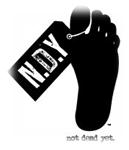 Today’s post comes from an “outsider,” but a FOJM for many years, Edison Research chieftain, Larry Rosin. Here are his observations about the state of radio’s perceptions.
Today’s post comes from an “outsider,” but a FOJM for many years, Edison Research chieftain, Larry Rosin. Here are his observations about the state of radio’s perceptions.
“Reports of Radio’s Demise Greatly Exaggerated”
So said the headline of a July 16 press release from Alan Burns & Associates. And we have heard this claim before – many times. Type the words ‘Radio, Greatly, Exaggerated’ into Google and you can find other articles which trot out the famous quote from Mark Twain bent around radio in some fashion or another.
Every time someone asserts, as Alan does here, that radio has not shuffled off this mortal coil, I think of the poor old man being thrown on the dead cart in Monty Python and the Holy Grail screaming “I’m not dead yet” only to be told: “You’ll be dead soon enough.”
>EMAIL RECIPIENTS: CLICK HERE TO WATCH MONTY PYTHON VIDEO CLIP<
Because when we employ this trope, all that most people will process is “Gee, there must be a lot of such reports” and a focus on the word “demise.” After all, only an entity in the process of ‘demising’ needs to keep telling everyone how robust it actually is. This is not to criticize Alan Burns – he and the others are attempting to state a positive. I just believe that all anyone will hear is the embedded negative.
Much of the defense of over-the-air radio has centered on how much listeners will always prefer what AM and FM bring – that curated, easy, lean-back experience. And this is precisely why the AM and FM powers-that-be should change course and encourage Arbitron (or at least someone) to measure ALL of radio. Not just AM and FM stations and their attending streams, but also podcasts, satellite radio, pure plays, and HD. And anything else that comes along. Because while AM/FM listening may be declining a bit in total hours of usage, to my mind radio is booming. When one thinks of all of radio, I have to believe there is more consumption than at any time in history.
Think about it. There are so many more choices and so many new ways to access them. Time-shifting is now a relatively easy option for radio if you care enough to do it. Why did Spotify come to America and how did Songza recently launch successfully? Because radio, writ large, IS very much a healthy, thriving, and growing medium. It is just expanding beyond AM and FM. In some cases, this expansion is happening with “legacy radio’s” guidance (think iHeartRadio) and, of course, in other cases by companies with no direct connections to the AM and FM media companies (SiriusXM, Pandora).
But instead, we have allowed ourselves to get mired in a discussion of ‘what is radio?’ Is Pandora radio or not? As I have argued strenuously, the discussion is pointless. If we accept that, at the very least, one can’t easily consume any one of these while also consuming another; they all compete for a finite amount of time no matter what the ‘technical’ definitions say. And not for nothing – Clear Channel seems to count all usage of iHeartRadio the same when it reports the numbers, both the streams of over-the-air radio stations (“Radio”, by their definition) and the custom stations (“not Radio,” so they say). And their promos invite you to listen to hundreds of stations or create your own, which would also suggest a lack of differentiation by the consumer. And one more point – if measured in a total universe, AM & FM license holders may become more motivated to develop new approaches and innovations.
 AccuRadio’s Kurt Hanson argues regularly that we are entering a new “Golden Age of Radio.” In the UK, where all forms of radio are measured together, this assertion has already been made. As I travel around the globe I generally hear nothing but optimism about the medium and its expansion in creativity and influence.
AccuRadio’s Kurt Hanson argues regularly that we are entering a new “Golden Age of Radio.” In the UK, where all forms of radio are measured together, this assertion has already been made. As I travel around the globe I generally hear nothing but optimism about the medium and its expansion in creativity and influence.
Only in America does one hear the echoes of Mark Twain. Demise? Not even close. Radio, when one thinks of it appropriately, is indeed stronger than ever before.
- Media In 2025: Believe It Or Not! - January 15, 2025
- Every Company Is A Tech Company - January 14, 2025
- The Changing Face Of Social Media (OR WTZ?!) - January 13, 2025




It depends on your definition on what radio actually is. This article goes some way to explaining that.
I strongly believe that if more ‘traditional’ radio stations would like to survive they need to push further into the online audio content world. Creating on demand podcasts, engaging their listeners via social media and linking the songs they play into their web content will all go some way to help ‘over the air’ radio survive in an internet dominated media world.
Mark Ramsey’s latest podcast references some great ways that radio stations can engage with their audience online:
https://www.markramseymedia.com/2012/07/radio-personalities-not-stations-are-the-brands/
MIke, thanks for the comment & for joining in on the conversation. Most radio stations have a lot of assets on which they can build.
Great write up Larry..but Danger, Danger Will Robinson! Until radio can get it’s arms around what defines a great station isn’t 872 PPM “pagers” in a market if 1.5 million or 1,900 in a market of 8,700,000 (Chicago)it runs a staggering danger of losing it’s grip on reality! All the personality branding (Mark’s post) and the ones like them are spot on…but in truth, Arbitron isn’t rewarding those brands in most markets!
The stranglehold that this “system” has on radio (and radio has allowed it to have) is the big story that no one is talking about!
Wow, did someone have a bad book? Seriously, Dave, the challenge of “measuring everything” is one that is on everyone’s minds, from those who manage and own brands to Arbitron. If THEY wish to respond to your comment, this space is available to them. I believe that part of the challenge is that we are so used to solely monetizing Arbitron ratings that when other assets (blogs, stream, podcasts) actually generate respectable-to-great web stats, station staffs are often hard-pressed to be able to sell them. Hey, we’re not the only ones. When Facebook struggles to sell its millions of mobile app users, it reinforces the notion that we’re all in the middl of a seismic media disruption. Thanks for commenting.
Hi Dave —
Measuring ‘all’ of radio will not be easy but it can be done. And the point is that if/when it is all counted, I predict that AM/FM Radio will look great. Almost without doubt AM/FM will have more than 80% of ‘total’ listening. Compare that to what, for instance, local television stations control of all viewing.
It doesn’t have to be Arbitron but as your post implies, it is likeliest from them. But my main point is — instead of maintaining that radio looks better if it keeps new audio forms out of the ratings, I think radio will look better if it invites everyone in. How that is done (some combination of PPM, server data, diaries etc) will be a challenge but it can be done.
Thanks for commenting!
Larry
What folding in the Pandoras, Spotifys and Songzas of the world would also do is change the narrative about 18-34s in this country. If you look at radio’s TSL declines, they are skewed heavily in that direction–but those listeners haven’t left the building. They’ve merely expanded *their* definition of radio. So should the industry, so radio can stop exaggerating its demise, and start trumpeting its strengths.
Good points all, Tom. There are some demographic stories here, but as you point out, 18-34s still show up, many of whom listen mostly in cars (yet another major topic). Traditional radio will need to fight harder and more aggressively satisfy their tastes and needs, and offer them a satisfying experience. Thanks for the insight and your comment.
This is kind of an ownership vs. user issue. Users don’t make the distinction that radio operators do and as Larry correctly points out, don’t care what you call Pandora, or Spotify or anything else they might listen to on a smartphone or car dash. But terrestrial owners strive to claim difference and superiority over all other audio streams and paint themselves into an out of touch corner in the process.
Of course, the Pandora’s and Spotify’s are bleeding red ink and neither really has a plan for or path to profitability. Terrestrial radio can stop worrying about delivery method when they can stop worrying about royalty rates. This could well be a real street fight with the music industry and the sooner radio puts the gloves on the sooner they can be platform agnostic, give people what they want however they want it and make a fair profit regardless.
Bob, I cannot disagree with any of this. Just as TV viewers don’t distinguish between network, cable, or pay channels to access the entertainment and information they crave, it’s all about who’s offering the best audio content where I am and when I want it. Thanks again for contributing to our blog.